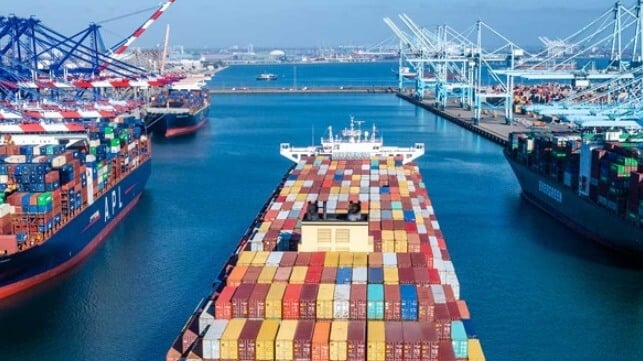Shippers Argue Inter-Alliance Shared Services Concentrate Markets

The Global Shippers Forum has entered the debate on the level of competition versus concentration in the global shipping markets arguing on behalf of cargo importers and exporters that the markets are more concentrated than regulators’ current assessments. Working with the transport economists from MDS Transmodal (MDST) they argue for a new way of analyzing the markets to consider the shared services under the inter-alliance agreements that go beyond the three major alliances that have been the focus of regulators.
“Current measures of competitiveness in the global liner shipping market are incomplete and therefore inaccurate and fail to take full account of the degree of cooperation between carriers which results in a more highly concentrated industry, to the serious detriment of shippers worldwide,” writes the groups in their analysis of the operations of the cargo carriers.
The level of competition in the markets has been the subject of close scrutiny by regulators in many parts of the world. South Korea’s Fair Trade Commission has for example charged multiple carriers with collusion and price-fixing arguing that in addition to the alliances, carriers were intimidating other carriers to follow their agreements. President Joe Biden lashed out this year at the three alliances citing the rapid growth in their market share noting that from 1996 to 2011 the alliances operated about 30 percent of global container shipping compared to today where they control 80 percent of global containership capacity and 95 percent of the east-west trade lines. He directed the Federal Maritime Commission and Department of Justice to work together to enforce the U.S.’s antitrust rules while internationally antitrust regulators also agreed to share information looking for domination of the markets.
The Federal Maritime Commission, however, in its fact finding concluded that the markets remained below the threshold for concentration, a point supported by the World Shipping Council which represents the carriers. WSC highlights that there are nine major lines transporting containers while saying there are an additional thirteen ocean liner companies that in 2022 operated over 30 percent of the sailings from Asia to the U.S.
“Competition authorities until now have relied on traditional but incomplete tools to assess the level of concentration across trades,” contends the analysis from the Global Shippers Forum (GSF) and MDST. They write that the current analysis does not take into consideration the full extent of cooperation between shipping lines through the inter-alliance agreements permitted under block exemption and other anti-trust immunity provisions. When the analysis is modified to factor in these shared services, they argue the measurements exceed the accepted threshold at which an industry is considered highly concentrated.
“This breakthrough analysis lays bare the degree of dominance that many shipping lines actually have in the key global trades,” comments GSF’s Director James Hookham. “Current measures of market concentration are only seeing part of the picture. Competition authorities should urgently revise their measures of competition to reflect the reality of the container shipping market.”

that matters most
Get the latest maritime news delivered to your inbox daily.
It is GSF’s contention that a lack of, or reduction in the levels of competition, leads directly to poor service quality for shippers. They point to examples such as the decline in the number of port calls completed versus scheduled. They contend it has fallen to 68 percent, which is the lowest level recorded since their analysis began in 2020. Shippers they say are suffering from further export delays as a consequence of lost capacity. MDST adds that its analysis shows the number of skipped port calls continues to grow while schedule reliability has stabilized at the lowest levels in the industry according to a separate analysis from Sea-Intelligence.
GSF is urging the FMC and all other competition authorities to utilize a modified measure based on alternative indicators that better reflects the degree of cooperation by lines by including agreements under which lines in different alliances operate shared services to understand shippers' true experience in the markets.
